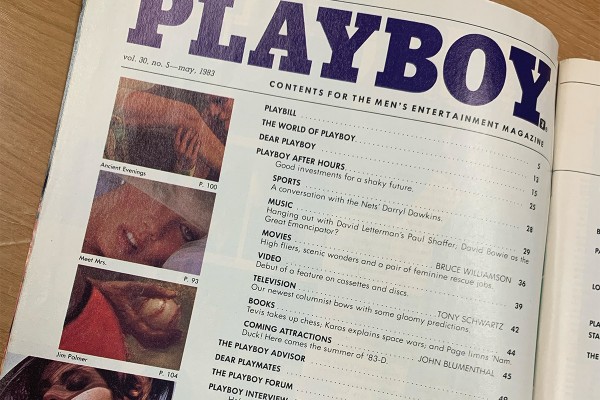The contemporary modern dating scene gets a look in the mirror in this year’s sex issue.
I spent the past week carrying a vintage Playboy in my bag, which was kindly loaned to me as part of my research. With plenty of full-frontal bush, tips for pleasing your wife, and ads for gentlemanly vices (booze and cigarettes), it was almost everything you’d expect from a 1983 edition of an “entertainment for men” magazine. Almost.
On one page, the Playmates are asked what is the best quality in a lover, and their answers – written beside sensual head and breast shots – were pleasantly surprising. The theme of their answers was that the women wanted to be desired as people, and loved tenderly. “I’m not expecting love on a first date,” one wrote, “but I would expect some interest in me as a human being, instead of a total sex object.”
When I read this, I put down the magazine and paused. It seems like common sense – of course you want to be shown affection by a lover – but that’s not really the case in the modern dating scene. Contemporary dating feels a bit like experiencing human emotion is forbidden. For instance, in Lady Jane Grey’s flatmate erotica culture piece, the emotionally detached casual fucking of two flatmates are put on a pedestal, while the romantic notions of another is shamed.
The theme continues in my article on the orgasm gap, where I noticed myself to be part of the problem. I automatically wrote “situationship” to describe a friend’s new situation with a girl she’s dating. Commenting in the doc, she gently corrected me, asking for it to be rephrased to “dating someone new”. Writing for the Otago student audience, my go-to is “situationship”, and I realised that that’s become the Dunedin norm.
Then in Tilly’s feature, students traverse the murky waters of relationship definitions. Noticing that there seems to be different definitions of what constitutes cheating in modern dating, she spoke to an ex-serial cheater and a roster-king. The reformed cheater definitely cheated (had sex with someone else while in a relationship) but the roster-king maintained that he was in the right, sleeping with different girls and keeping it hidden from each. While “technically” not cheating according to Dunedin’s rules, it still feels wrong.
It’s not hard to see how this has happened in the modern era of sexual liberation and dating apps. As a consequence of flicking through Tinder profiles where people are given a split second to impress, the human experience is flattened. The same DM conversations are blandly repeated, sometimes copy and pasting pick-up lines or answers between your suitors, or messages are ignored altogether. Any suggestion of meeting up, or taking things further, comes with a rule book. You can’t seem too eager or desperate.
It was different back when this issue of Playboy was published. Our parents met in pubs, probably, openly flirting over sips of beer and taking turns choosing a song to put on the juke box. There seemed to be less games. It was simple: I like you, I want to date you, let’s be together.
This year, I’ve gotten into a new relationship. I don’t know if I could pinpoint exactly where this has come from, but I’ve grown shy or embarrassed sharing good parts of the relationship with my friends. I’ll preempt anything I consider to be “gross” (read: cute) with “cringe, but –”. Two close friends who visited me recently snapped me out of it. “Why do you do that?” one of them asked me. “We like seeing you happy.”
I suppose my point is that expectations, rules, or generalisations determining our love and sex lives can be harmful. Sex and relationships are when we’re at our most tender, intimate, and vulnerable. Our most human. I’m not trying to say that I’m judging anyone who has casual sex, sees more than one partner at a time, or establishes boundaries with anyone who they decide isn’t for them. What I do think to be true, though, is that we’re only hurting ourselves by suppressing emotion in our sex lives. Food for thought.







